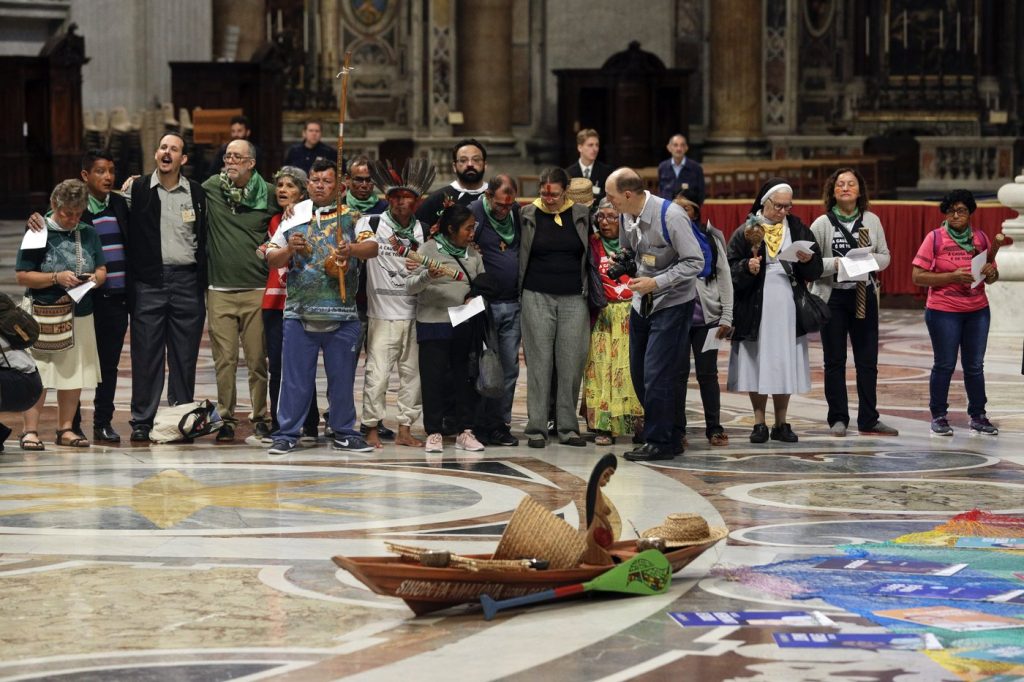Vandals behead a controversial sculpture of Mary giving birth to Jesus in an Austrian cathedral

VATICAN CITY (AP) — Vandals have beheaded a sculpture featuring the Virgin Mary giving birth to Jesus that had been exhibited in the cathedral in the Austrian city of Linz and drawn criticism from some Catholics who said it was blasphemous.
The sculpture had been on view at the St. Mary Cathedral, Austria’s largest, as part of an art installation project on women’s roles, family images and gender equality, the Linz diocese said in a statement. It added that the incident, which occurred on Monday, had been reported to police.
The identity of the vandals wasn’t known. But Alexander Tschugguel, an Austrian traditionalist Catholic responsible for the so-called “Pachamama” act of vandalism during the Vatican’s 2019 Amazon synod, said in a social media post Tuesday that he had been contacted by those responsible.
Advertisement
Tschugguel praised the “Hero of Linz” and posted what he said was a statement from the anonymous vandal explaining the motivation. The statement implied that the person’s emails and calls to the diocese to complain about the sculpture had been ignored.
“Therefore, in view of this abominable and blasphemous caricature, urgent and decisive action was required,” the statement said, adding that the beheading was the fastest way to disfigure the sculpture so it no longer resembled Mary.
The episcopal vicar for education, art and culture in the Linz diocese, the Rev. Johann Hintermaier, condemned the beheading of the statue.
“We were aware that we were also provoking debate with this installation. If we have hurt people’s religious feelings, we are sorry, but I strongly condemn this violent act of destruction, the refusal to engage in dialog and the attack on the freedom of art,” the diocesan statement quoted him as saying.
The sculpture was on a pedestal in the middle of the room inside the cathedral, showing Mary sitting on a rock and giving birth. The diocese said it referred to the nativity scene in the cathedral, which is also known as the Mariendom.
Advertisement
The artist who created the “crowning” sculpture, Esther Strauss, also condemned the destruction, according to the Linz diocese statement.
“Most portraits of the Virgin Mary were made by men and have therefore often served patriarchal interests,” she said, adding that in her sculpture “Mary gets her body back.”
“Whoever removed the head from the sculpture was very brutal,” Strauss said. “For me, this violence is an expression of the fact that there are still people who question women’s right to their own bodies. We have to take a very firm stance against this.”
Tschugguel became a hero to traditionalists in 2019, when he snuck into a Vatican-area church, stole Amazonian indigenous statues of pregnant women, and threw them into the Tiber River in a videotaped act that was quickly shared online.
Amazonian delegates to Pope Francis’ synod, or meeting, had brought the statues with them to Rome and had displayed them in the Vatican gardens during an opening prayer for the meeting, which was discussing how the Catholic Church could better serve the indigenous faithful in the region. Critics complained that the display of “pagan” idols in the Vatican was sacrilegious.
Advertisement
The episode became known as the Pachamama incident, named for the types of fertility statues involved, and was visceral evidence of the lengths to which conservative and traditionalist Catholics were willing to go to vent their opposition to history’s first Latin American pope.
In the end, Italian police divers recovered the statues from the river and returned them to the Vatican. Francis apologized to the Amazonian delegates, and the statues were displayed in the closing sessions of the synod.
___
Associated Press writer Kirsten Grieshaber in Berlin contributed to this report.
Advertisement
Nicole Winfield, The Associated Press
